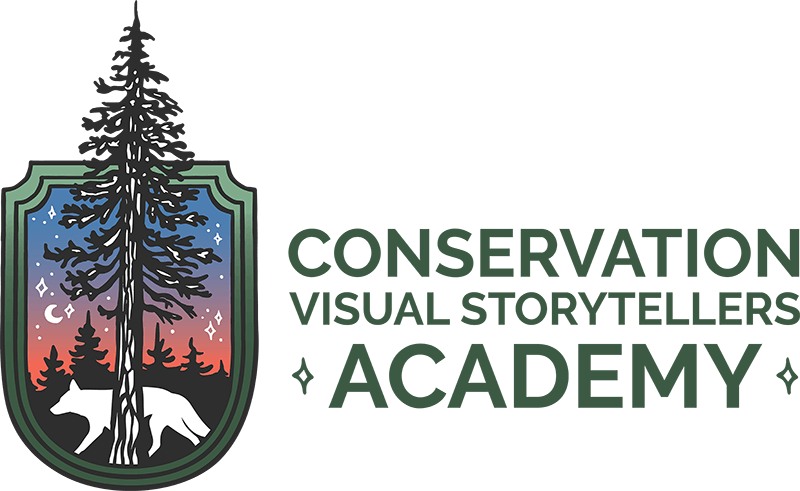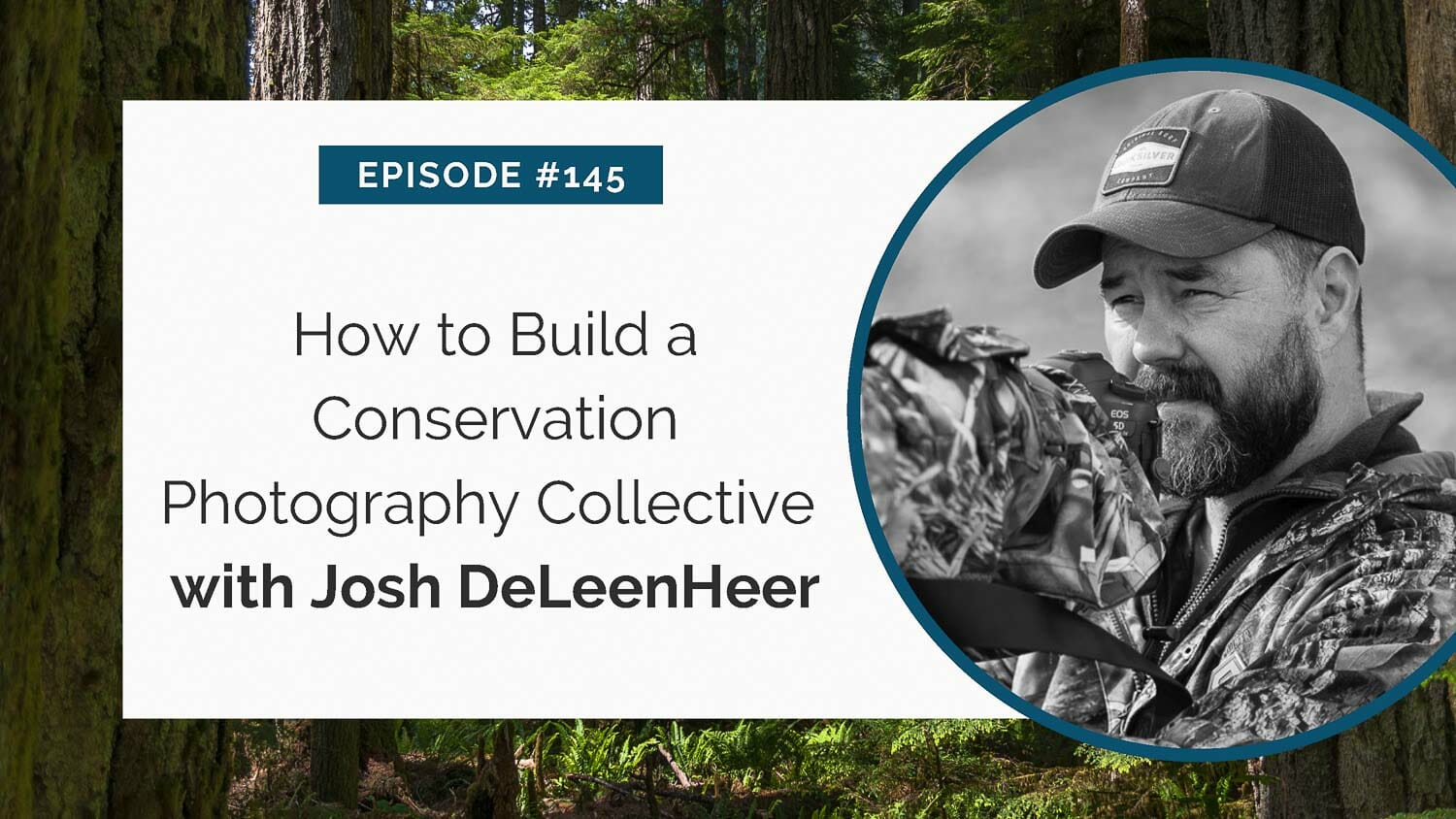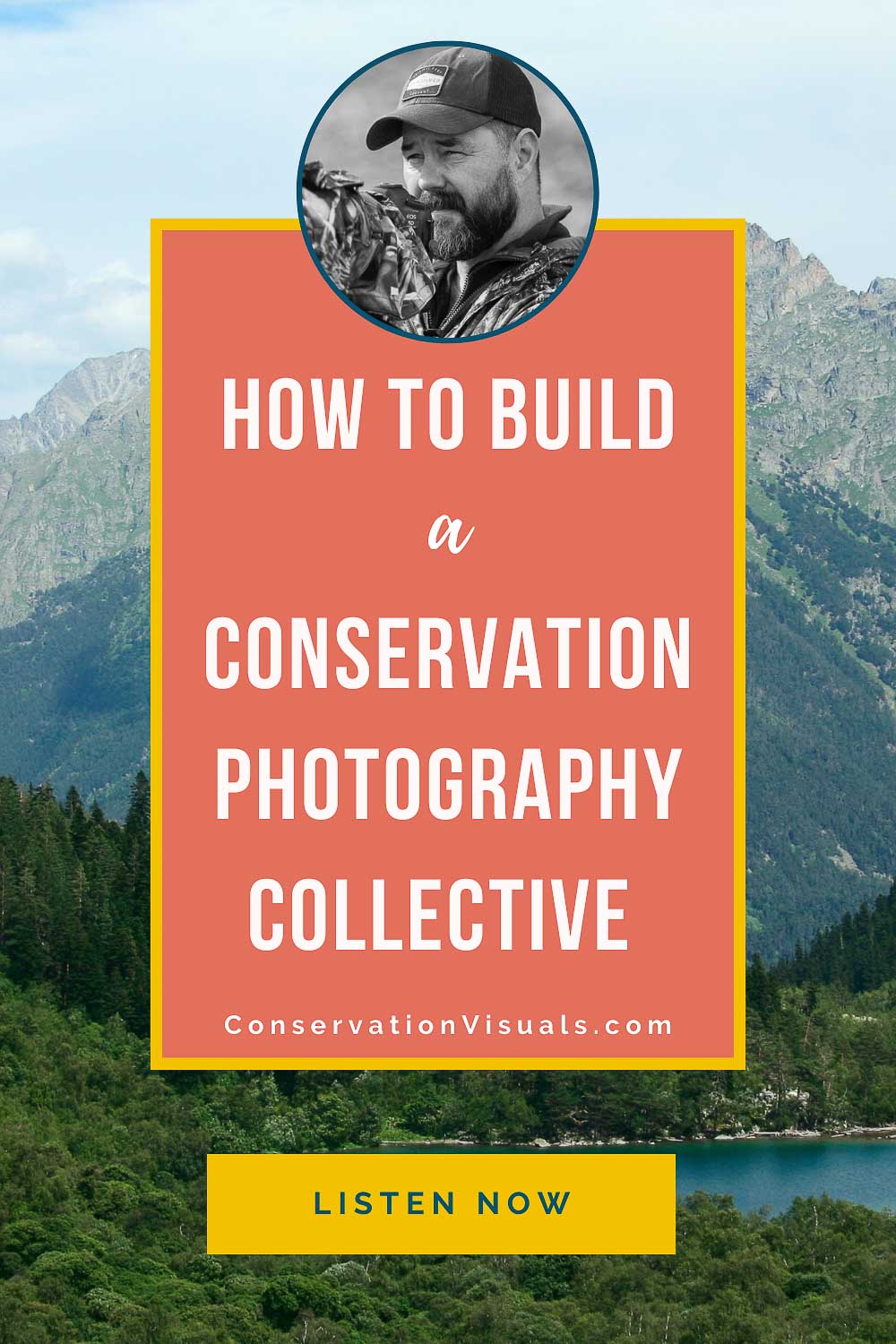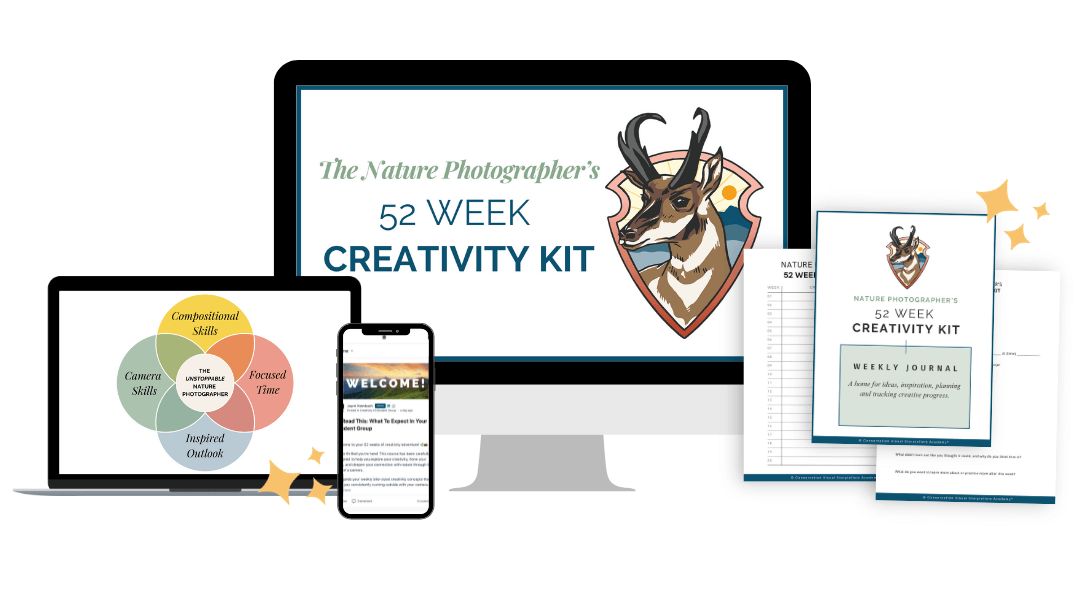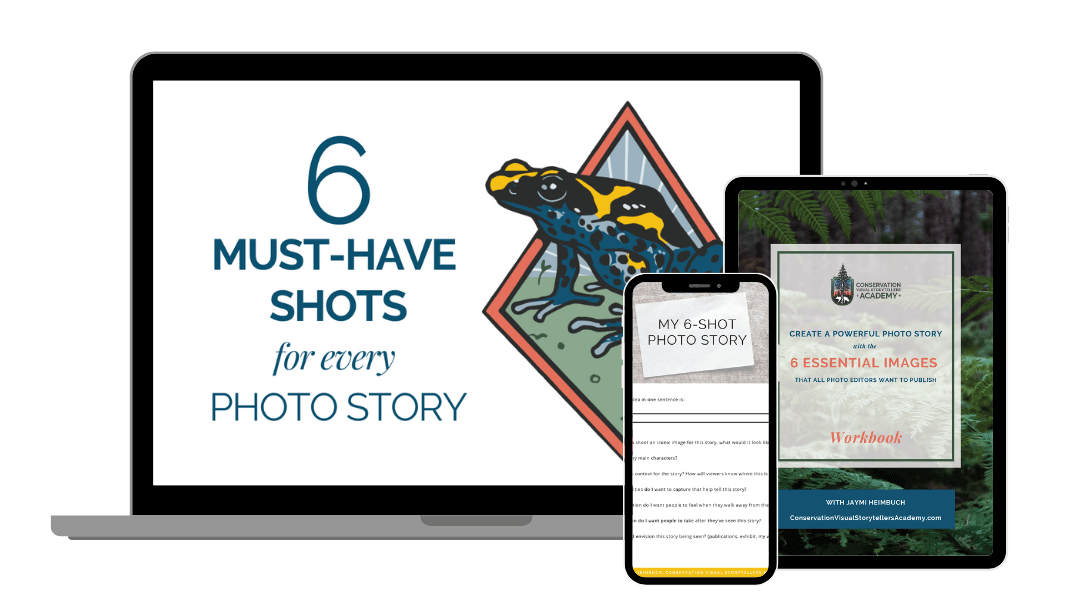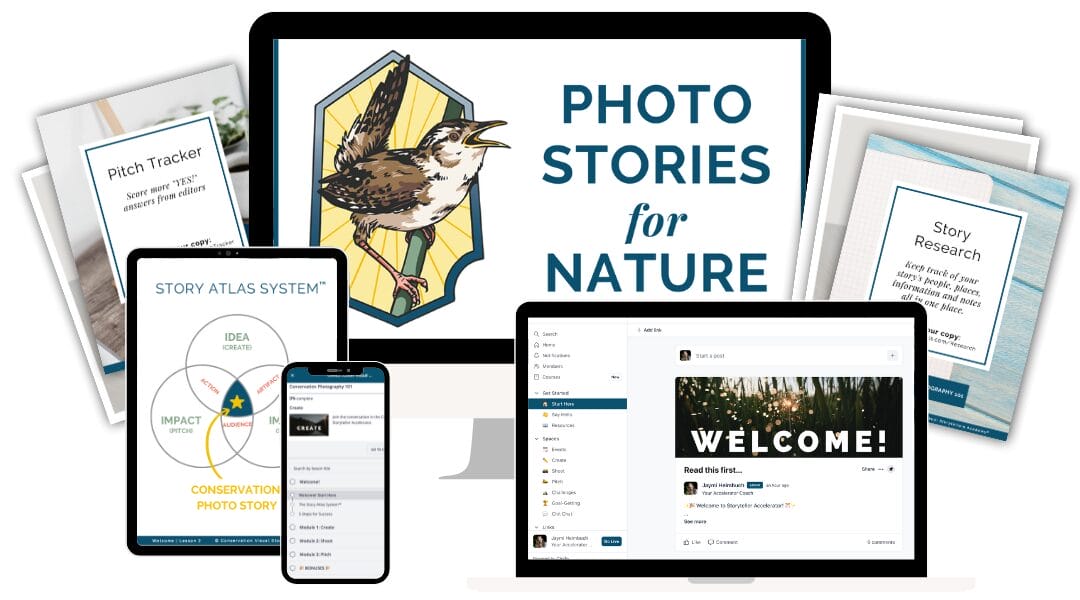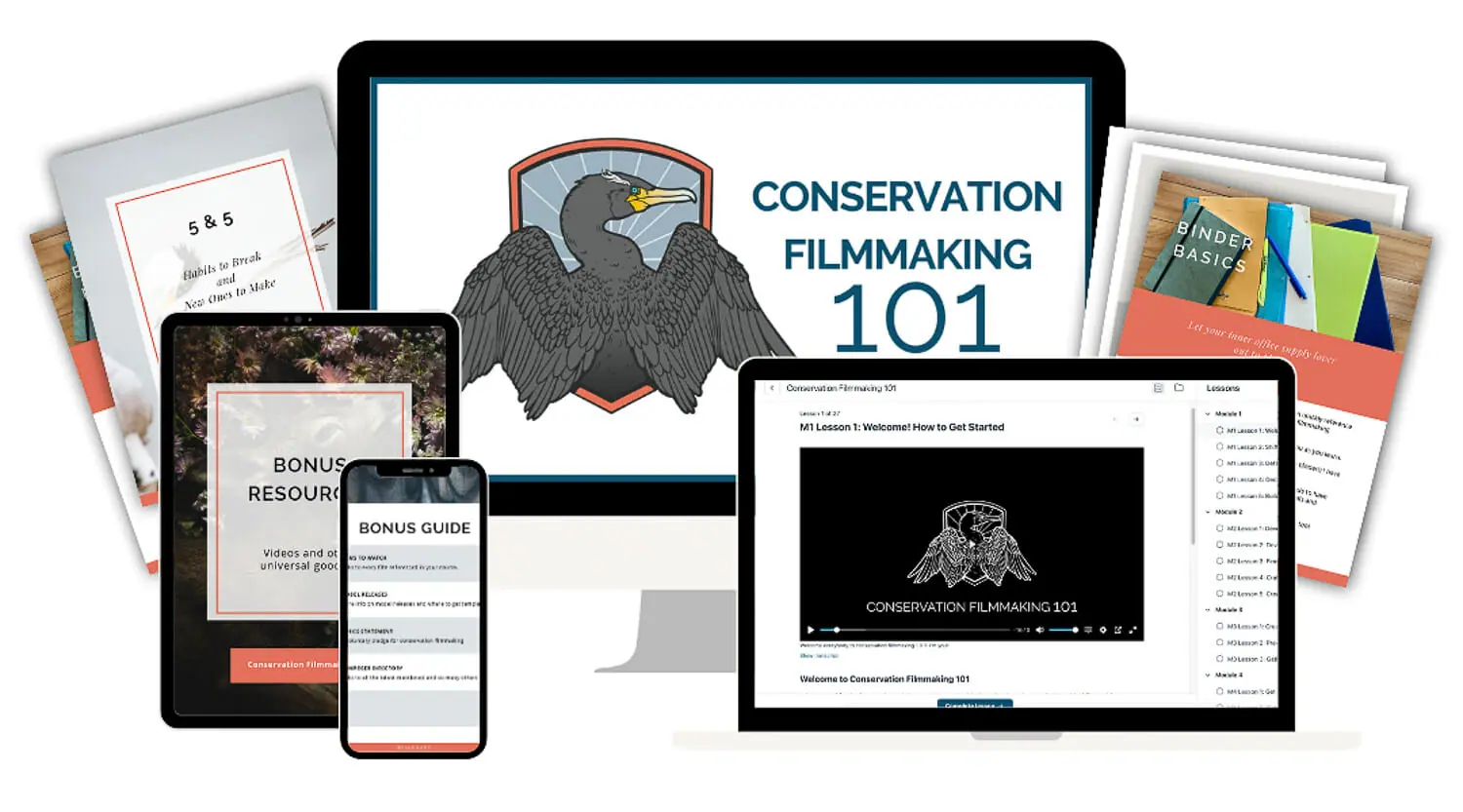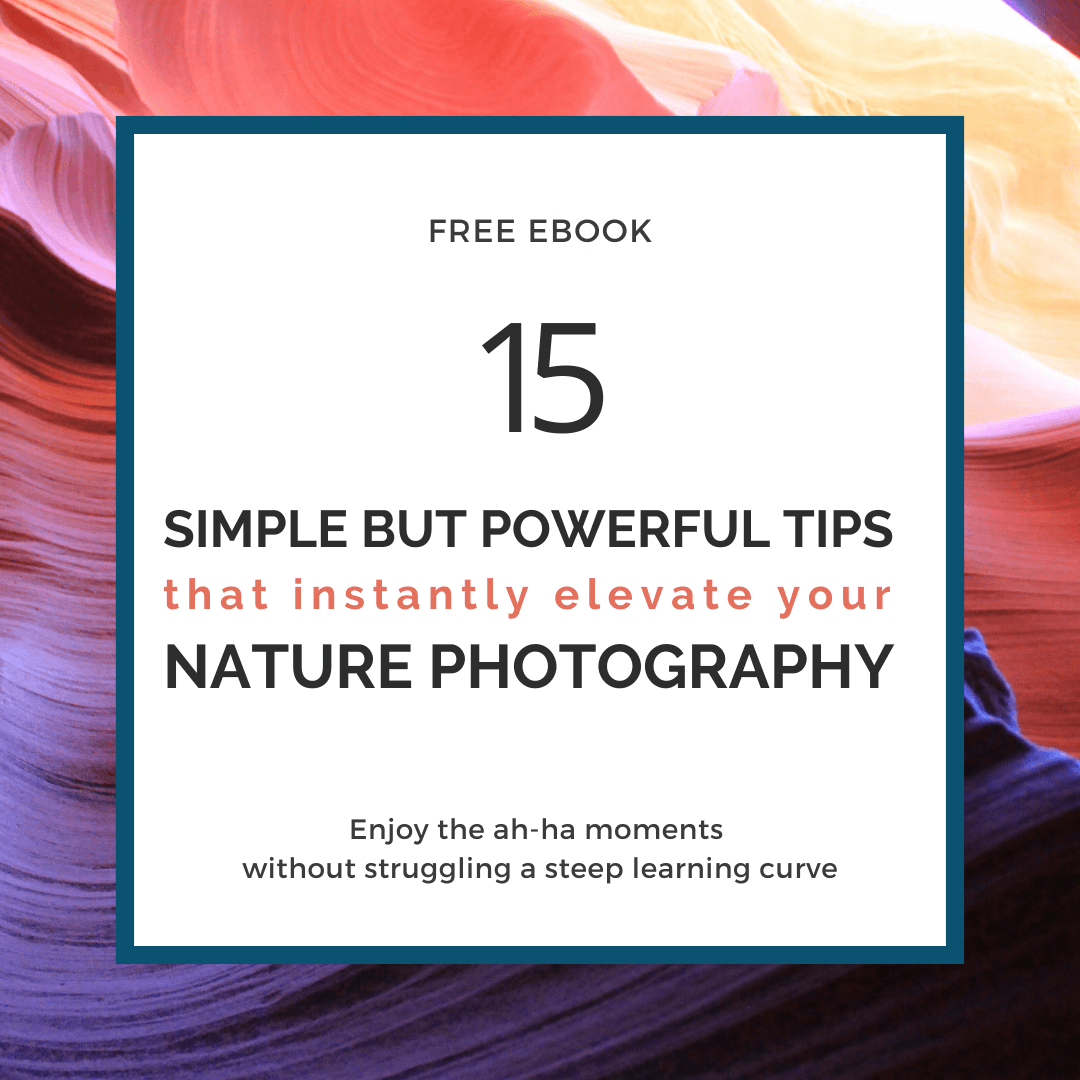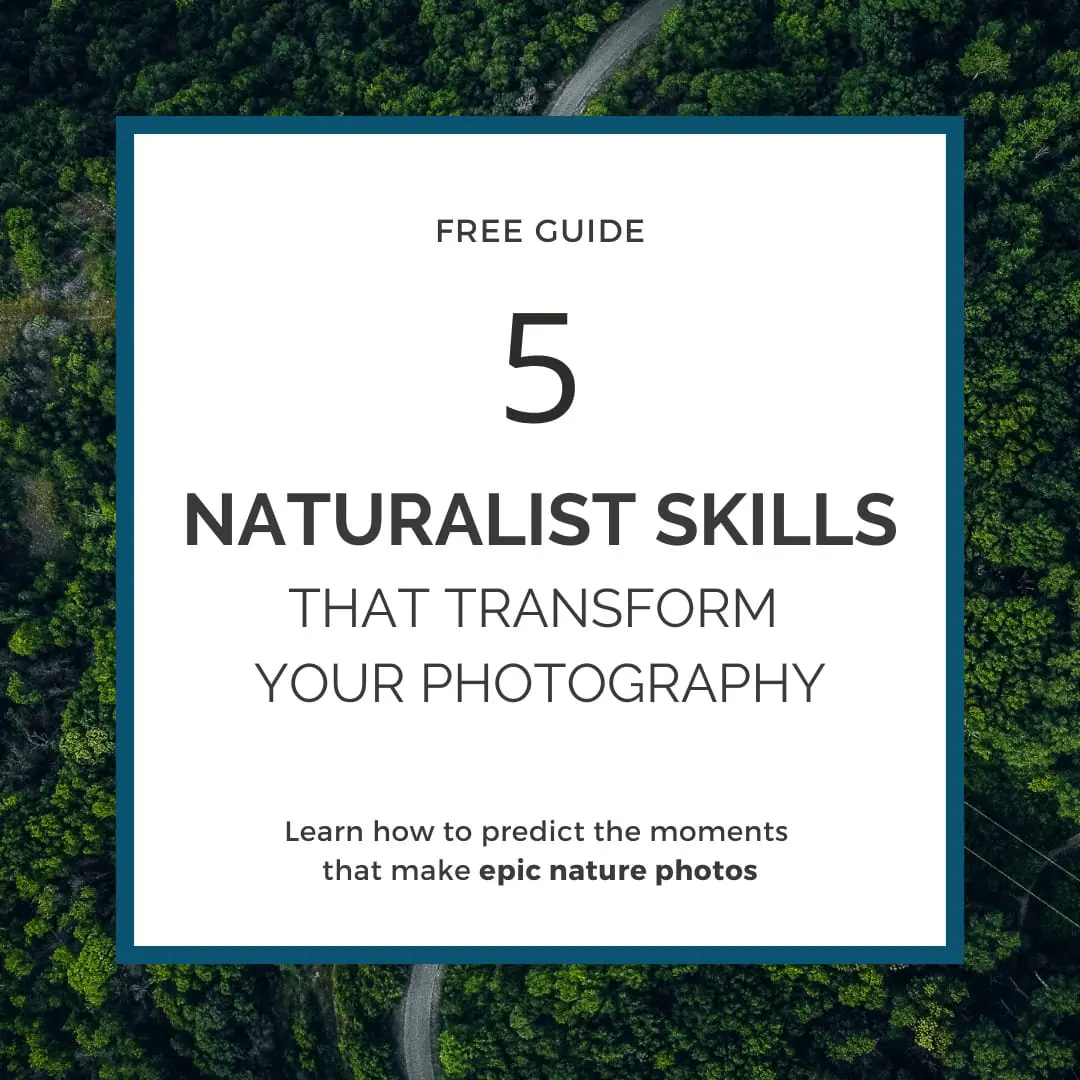How to Build a Conservation Photography Collective with Josh Deleenheer
Curious about being part of a photography collective? Maybe you’ve wanted to create a group of change-making creatives in your area. Learn what it takes to launch a thriving, impactful conservation photography collective with Josh DeLeenHeer from the Canadian Conservation Photographers Collective. Discover how this remarkable organization promotes their cause while also promoting photography as a profession.
Josh DeLeenHeer is one of the energetic co-founders of Canadian Conservation Photographers Collective, an incredible organization that works hard to promote conservation photography and connect photographers across the nation.
I asked Josh to sit down with us and dish about how such an amazing effort like this is accomplished. We learn how Josh facilitates conversations among members of the collective, their commitment to open dialogue, and why democratic voting is so important when taking collective action. Josh also shares how you can get involved with the collective!
You’ll Learn:
- How the Canadian Conservation Photographers Collective works to promote conservation photography
- Strategies the founders used to create a supportive, engaged group of creatives
- The benefits of being part of a collective like this
- How Josh facilitates conversations among members of the collective and their commitment to open dialogue
- Why democratic voting is so important when taking collective action
- How listeners can get involved with CCCP and even apply to be part of it
- Advice for starting a collective in your own area
And if you’re based in Canada, CCPC opens its doors for membership applications every year with applications closing on February 15th. This opportunity allows photographers to be part of a supportive and engaged group of creatives, all committed to using their craft to make a difference!
Resources Mentioned
- Canadian Conservation Photographers Collective
- CCPC on Instagram
- CCPC is also mentioned in our interview with underwater photograph Shane Gross, who is a member!
Episode 145: How to Build a Conservation Photography Collective with Josh Deleenheer
Shownotes: ConservationVisuals.com/145
(Digitally transcribed, please forgive any typos)
Jaymi Heimbuch:
[00:00:00] Jaymi Heimbuch: All right. Welcome to this episode of Impact, the Conservation Photography podcast. And I am really excited about this episode and our guest today because it's all about memberships and collectives and community building, and that's something that I find so, so critical in conservation photography. So Josh dalene here, welcome to the show.
[00:00:24] Josh DeLeenHeer: Absolutely.
[00:00:25] Jaymi Heimbuch: So for anyone who doesn't know you yet, I'm gonna kind of let you sort of introduce yourself. I already have a bit of an intro in this episode, but I wanna give you a chance to introduce yourself for anyone who's never met you.
[00:00:36] Jaymi Heimbuch: Who is Josh in the world?
[00:00:39] Josh DeLeenHeer: So I am a Canadian conservation photojournalist. I'm based in British Columbia on Vancouver Island. I've been a photographer a little more than five years, but I've been a conservationist really since I was a teenager which is why I got into this genre. It was my passion for conservation that led me to photography [00:01:00] rather than the other way around.
[00:01:01] Josh DeLeenHeer: You know, I saw it as an opportunity to really connect people with the issues that are going on around us. I thought it was a positive way to build that relationship. So I've been, yeah, I, this has really been an opportunity for me to I guess, delve into that passion of mine.
[00:01:21] Jaymi Heimbuch: Excellent. Yeah. It is really amazing that when you know that conservation is a realm that you wanna focus in, how naturally photography can slide into that, that power of visual storytelling and knowing that images are so essential and the two are just hand in hand. I, it's amazing to me though, that you've been really heavy into photography for five years, which ultimately is.
[00:01:43] Jaymi Heimbuch: Kind of a short amount of time and looking at everything that you've accomplished in that short amount of time is really, really impressive. So are you just kind of going on all cylinders 24 7?
[00:01:56] Josh DeLeenHeer: No, unfortunately I, you know, I work a [00:02:00] full-time job. So really my opportunity is to get out and photograph for evenings and weekends and, and when I'm able to book some dedicated time off to do it. That said, you know, I, take every opportunity to. Not just work on focus on my own photography, but really , I spend an inordinate amount of time on the collective, which is a passion project.
[00:02:23] Jaymi Heimbuch: Absolutely. Okay, so let's jump into the Canadian conservation photographer's collective. What is this organization? Can you tell us kind of what it is and how it got started?
[00:02:36] Josh DeLeenHeer: Absolutely. So we have 34 photographers, and I believe the, the number fluctuates, but I think we're around 10 or so volunteers that make up the collective. The, the collective officially launched in October of 2021, but we were working at it for a couple years prior to that to prepare for that official launch.[00:03:00]
[00:03:00] Josh DeLeenHeer: It started as a conversation on Instagram in curiously. So I threw out this idea that this would be something really interesting to start to connect conservation photographers in Canada together. And I got some responses that was in 2019. Didn't pursue it at the time, but decided a year later to try it again.
[00:03:24] Josh DeLeenHeer: And that, at that time I thought, okay, we've got a. Follow through with this. So I started having conversations with Justin tos who was one of, who was one of the other founding members. And we started having emails and, and, and chats on Instagram. Then we started having phone calls. Justin came with a wealth of ideas.
[00:03:44] Josh DeLeenHeer: He'd clearly been thinking about this for a while and, and really had, you know, some great vision for it. So based on that, we decided to reach out to other people. We had about, Five photographers. We had some conversation amongst [00:04:00] ourselves and said, all right, we need, we need some more. We need more people to kinda kick this off.
[00:04:04] Josh DeLeenHeer: So we reached out to people that we knew, or people they were connected with on Instagram that got us to about 19 photographers. So there were a few months of preparation in, in advance of our launch where we were building the website defining our ethical guidelines, things like that, so that when we launched we, we were prepared.
[00:04:25] Josh DeLeenHeer: With that, you know, we had our Instagram account up and running and so on. Very quickly realized that photographers don't necessarily want to administer an organization. So we we pivoted within a couple months where we started recruiting volunteers to, to really manage the aspects of, you know, the business, the, the management of this organization, which has been fantastic.
[00:04:54] Josh DeLeenHeer: We have an extraordinary group of volunteers, highly qualified dedicated, passionate [00:05:00] people that, with skills in particular areas that we're lacking. Which is invaluable. So I've been extremely grateful for their contributions and for what they do to keep this ship floating.
[00:05:12] Jaymi Heimbuch: Absolutely. So what does the ship accomplish? What is it that you as an, as a collective, really get out there and, and do?
[00:05:22] Josh DeLeenHeer: So our primary goal is education. That, that is at the core of what we're doing, but you know, we have A bit of a mantra. It's educate, engage, and inspire. So we want a, we want to be able to inform people. B, we want to give people opportunities to engage in conservation subjects, and we wanna inspire them to take meaningful action on their own.
[00:05:46] Josh DeLeenHeer: So that's really at the heart of, of what we are and what we're doing, the way that looks. So right now we have, obviously, we, we post different subjects. Our, we, our social media [00:06:00] team will glean from the accounts, the Instagram accounts of our photographers. Pull various different images and content, sometimes supplement the content if, if it's lacking a little bit there, trying to, you know, boost it up so that there is that conservation focus.
[00:06:16] Josh DeLeenHeer: So that's, you know, a bit of the educational component. We've had, I think, three different webinars that we've hosted now. The first was by one of our members Donna Fletc, Dr. Fletc Who did a, a presentation about great grays and it was really about it. It was kind of a combination of things. It was how to go out and photograph great grays.
[00:06:40] Josh DeLeenHeer: So you know, that's going to appeal obviously to photographers, but also about the ethics around it. You know, how to be respectful of great grays, how to approach them cautiously, when to know. When to leave, those sorts of things. How to read the signs of, of an owl and know that, all right, it's, it's becoming [00:07:00] stressed or whatnot.
[00:07:00] Josh DeLeenHeer: So really approaching it from that direction. So also combining that conservation aspect into it. We had another presentation by a photographer who did an extraordinary trip, you know, the Alaskan Wildlife national Refuge. I'm not sure if I've got that in the right order there, but he was out photographing the porcupine haribou caribou herd.
[00:07:24] Josh DeLeenHeer: And then the last one was actually really interesting. It was based on some conversations with some of the female photographers in our collective who were talking about some of the challenges and, and I guess aspects of being a female conservation photographer. So we, we hosted a Female lens on photography, I think was the, the name of the webinar.
[00:07:46] Josh DeLeenHeer: And it was a discussion between one of our members, again, Dr. Chu and Jenny Wong, who's an extraordinary Canadian conservation photographer. So really talking about, like I say, the, some of the challenges they, they experience in the field, but also the, the [00:08:00] unique perspectives that they bring to the genre.
[00:08:02] Josh DeLeenHeer: Just a, a well-balanced discussion and it, it was a great success. So that's some of the things that we've been working on.
[00:08:10] Jaymi Heimbuch: That's wonderful. I mean, I feel like what others receive from your collective is really clear and really exceptional. And I'm curious about what is it like to be a photographer as part of this collective? Is it something that. Anyone can reach out and request a bee. What is the community situation like?
[00:08:32] Jaymi Heimbuch: What, what benefits are there for the photographers who are part of the collective?
[00:08:39] Josh DeLeenHeer: So we have a recruitment process now in place each February we, we let people know that we're gonna be recruiting, we ask them to submit applications. You know, there's a form that helps. Give us a bit of information about who they are, what their interests are, what their experiences are, particularly obviously in, in photography and conservation.
[00:08:59] Josh DeLeenHeer: So those are the [00:09:00] two key criteria that we look at when we're examining new candidates. We want. To see exceptional photography skills, but we also want people who have a demonstrated consistent history of promoting conservation. So that's not always the case. In some of the applications that we receive, we might get exceptional photographers, but really haven't shown clearly what they've done to promote conservation and contribute to it or vice versa.
[00:09:27] Josh DeLeenHeer: Sometimes we get strong conservationists, but their photography skills need some development. We now have a page on our website that helps define that more clearly so that there's that understanding upfront. And we'll be directing people to that. So if there's any questions, you know, after the decisions have been made, we can say, all right, if, if you haven't had an opportunity, please do read this.
[00:09:48] Josh DeLeenHeer: Because of course we can't release the, the contents of the discussion of the selection committee. That's, that's amongst themselves. But you know, we do want people to have that clear understanding of what it is that we're looking [00:10:00] for. So once we invite people into the collective, they have an opportunity to contribute in a number of different ways.
[00:10:07] Josh DeLeenHeer: That might be, you know, as I said, speaking on webinars, contributing basically their ideas overall into the direction that we want to be going and, and obviously at the heart of it or the images and, and the video content and so on that they produce. We then utilize that in a number of different ways.
[00:10:25] Josh DeLeenHeer: So we've, we've taken a couple different approaches. We are not yet incorporated as a nonprofit. That's, that's one of our primary goals in the near future. But in order to reach that point, we're trying to generate a. Income so that we can become financially sustainable. We want to be able to earn our income rather than relying heavily on donations and things like that.
[00:10:47] Josh DeLeenHeer: So a couple of things that we've been doing is we've developed a service package that we offer to organizations, which might be environmental, non-governmental organizations or NGOs, [00:11:00] might be government, agencies, might be First Nations, could be university departments where we say, You know, we, we do our research.
[00:11:09] Josh DeLeenHeer: We find that they are engaged in some kinds of conservation projects, and then we approach them and say, if you are interested for a fee, we can send our photographers out to document the work that you are doing. And then you can then use those images to promote your work, be it through whatever channels that they're utilizing.
[00:11:28] Josh DeLeenHeer: So that's one approach that we've taken. The other is that we're currently developing an online catalog of photographs, of images that we can then license to similar organizations. So we would approach them and say, okay, we've got this bank of images. If you have a, an upcoming campaign or something of that nature where you could use these types of images for a fee.
[00:11:51] Josh DeLeenHeer: Again depending on the usage and the duration and so on, these images are going to be available.
[00:11:57] Jaymi Heimbuch: Excellent. Well, so it [00:12:00] seems like. Being part of C Ccpc is really amazing because you're getting extra opportunities to get out there and photograph to work for clients to license images that you may not otherwise have. I'm curious also about the community aspect of it. Do you get together and. Do meetings or networking or what does that look like in terms of just really getting a chance to connect with other photographers and share stories from the field or swap experiences, that sort of thing.
[00:12:32] Josh DeLeenHeer: That's one of the. Really great benefits of being part of this collective. So we have a monthly formal meeting where we talk about the activities that we are currently engaged in and the things that we're planning and so on. We also have a a monthly meeting in the middle of the month. That's just an informal discussion and it's, it's kind of a drop in meeting you, you can show up for as long as you're available.
[00:12:58] Josh DeLeenHeer: And I actually find [00:13:00] that the photographers are oftentimes more engaged in that meeting because it's such a, a great opportunity to, to ask those questions you might not get to otherwise to learn about people's experiences. And we all have questions, you know, photo, some of the photographers have experiences in a professional capacity, others don't.
[00:13:19] Josh DeLeenHeer: Some have have worked on contracts, others haven't. It's, it's really a great. Opportunity to, to communicate in that way. And, and it's certainly appreciated. Beyond that , we've gone out in small groups , and shot together, which has been fantastic. So one of the conservation topics on the west coast of Canada , it's the herring spawn that occurs in the coastal waters of British Columbia.
[00:13:46] Josh DeLeenHeer: Years ago there were five viable herring fisheries off the west coast. There's now just one. So overfishing over time has decimated the herring population. So it's one of those subjects [00:14:00] where we've taken an interest and, and it's an opportunity, it's an extraordinary event in itself.
[00:14:04] Josh DeLeenHeer: So just to be there and witness and capture is really a unique experience when, when you see. Hundreds of thousands or millions of herring out in the water and, and they're spawning. The, the water turns this turquoise blue. It's, it's extraordinary and it draws all these different species to it. Like sea lions, otters seagulls eagles.
[00:14:25] Josh DeLeenHeer: There are hundreds of eagles that, that converge in this area, you know, for this event. And of course the fishing fleet. So we're there to capture the beauty, but also document the challenges. That, that these these species face. So in doing so, it's, it's just this great time to, to get together, you know, work together.
[00:14:47] Josh DeLeenHeer: You, it's a learning experience. You're learning from each other. You're, and there's of course the between shooting you ha there, there's fun, you know, of course that goes on in the evenings. And so it's, it's really enjoyable in that respect as well.[00:15:00]
[00:15:00] Jaymi Heimbuch: Wonderful. I feel really strongly that finding community, being part of a collective and organization can be really fulfilling because I think a lot of times, especially in specifically conservation photography, it can be really tough. Not only creatively difficult, but you're also dealing with these.
[00:15:20] Jaymi Heimbuch: Emotionally complex issues. Lots of just struggles I'm hearing a lot about having eco anxiety and compassion fatigue, you know, things like that that are really coming up a lot. And so having a group of people that you can get creatively fired up and inspired by actually hang out with, but then also talk the same language.
[00:15:40] Jaymi Heimbuch: About what you're, what you're going through, what you're seeing, what you're emotionally struggling with, politically struggling with. I think that that is huge. So have you seen in the people who have been part of the collective, either since the beginning or who have joined more recently have you seen any kind of specific changes or benefits [00:16:00] for them in, in their work in being able to have that community to rely on?
[00:16:05] Josh DeLeenHeer: It's, you know, it's an intangible, so it's, it's sometimes difficult to quantify. But I would say yes. I think again, going back to those informal conversations that we have, whether it be in, you know, in the monthly meeting or when we get together, there's a lot of information sharing that goes on.
[00:16:23] Josh DeLeenHeer: People are, are. Learning valuable skills. I would say sort of in a professional capacity, you know, better understanding what it takes. Some people have really been able to create this career and others are, are aspiring to it. So from that perspective, I, I think it's been really advantageous.
[00:16:43] Josh DeLeenHeer: I think. Any time that, that you have conversations, you know, with regards to the conservation subjects and the more, I guess, emotional aspects of this. It's, it's always a learning experience. You get these different perspectives. As I say, I've been passionate about conservation for years, but I,
[00:16:58] Josh DeLeenHeer: anytime I get to [00:17:00] hear a different perspective that's informed and considered, it really helps me as an individual to grow as well. I don't necessarily always want to be in an echo chamber. Yeah, sure. We, you know, we, we tend to think along the same lines, but I would say, It's, it's just great to learn from each other.
[00:17:22] Josh DeLeenHeer: And that that happens not only in, in sort of those conservation aspects, but within the organization as well. People think of things that I don't and, and vice versa. That I think really helps to expand our, I guess, concept of who we are and what we're doing. And I, I think it's really beneficial. So having this group of people to collaborate with is beneficial for everyone, I would say.
[00:17:47] Jaymi Heimbuch: Absolutely wonderful. Okay, so I kind of wanna return back to something that you mentioned earlier. I have a lot of listeners who are in different parts of the world. So even though there's definitely a lot [00:18:00] of Canadian listeners who will probably be knocking on your door for folks who are really interested in creating a collective where they are in whatever, you know, country or county or whatever it may be that they're in, you mentioned, you know, photographers.
[00:18:13] Jaymi Heimbuch: Aren't necessarily that interested in actually administering a community. There's a lot of work that goes into running a successful community, let alone if you're going to build that into a nonprofit or a collective that is working as a cohesive unit to accomplish certain goals. So that is difficult work.
[00:18:33] Jaymi Heimbuch: What are some of the things that it takes for you to run C ccp C so successfully?
[00:18:41] Josh DeLeenHeer: I think first of all, you gotta be passionate about what you're doing. There is, there are always going to be challenges when you form a new group and you know, at any point in, in the evolution of an organization. So having that passion to get through those difficult times is really helpful. I think it helps to do your research, be informed about what it [00:19:00] means to be a non-profit, what, you know, what, what, what it means to work with a group of volunteers.
[00:19:05] Josh DeLeenHeer: Because we are all in volunteers, so there's, there's no point at which I can turn around and say, you must do this. It's. Could you please do this? You know, these are the deadlines that we're working within. If you have an opportunity, please contribute. Some people are able to, others aren't. And that's, that really speaks as well to.
[00:19:25] Josh DeLeenHeer: Having, considering the size of your group, particularly one of this nature, the more people you have the more that are able to contribute within the times that they're available. So if you've got, say, a group of. 10, but only three are able to contribute images, you know, on a specific deadline that really limits your ability to make a significant con contribution or, or be effective in what it is that you're, you're attempting to do at that time.
[00:19:54] Josh DeLeenHeer: We keep expanding and as we do, so that gives us greater ability to provide the kinds of [00:20:00] services that we're hoping to do. So that's important, I think. Good. Community building skills is helpful. I think you've gotta consider the needs of everybody. You've got, everyone's coming from different perspectives and everyone has different life circumstances that you have to factor into your decisions.
[00:20:18] Josh DeLeenHeer: You've gotta be respectful. You have to be mindful. I think doing your research you know, one of the things that. In advance of us incorporating it as a nonprofit is, is really coming to a better understanding of what the requirements are going to be to take that next step in our evolution. So that's something that is currently underway and, and we'll continue.
[00:20:40] Josh DeLeenHeer: And, as we go through this I think good leadership skills factor in as well. Particularly in this case, you know, as I mentioned, we've got our team of volunteers and we've got our team of photographers. There's a little bit overlap, but for the most part, they sort of operate independently.
[00:20:56] Josh DeLeenHeer: So you've gotta put one hat on to work with or your, your [00:21:00] volunteers and you've gotta put another one on to, communicate with your photographers. They have different needs that you've gotta balance. So it's there, there's a lot to consider, but. I would say don't ever let any of that stop you. It's, we each have strengths and we each have areas that we need further development in.
[00:21:20] Josh DeLeenHeer: Play to your strengths, and then take the time to try and develop in those areas where perhaps you're not as strong or find people that help compliment your strengths. And I think that's really important.
[00:21:34] Jaymi Heimbuch: Yeah. And you mentioned that you have volunteers specifically to help with the administration side of things and, and you mentioned the social media account. There's a website that needs constant attention. I'm sure there's also the selection committee and everything that goes into that. Morgan Heim and I created her Wild Vision Initiative, which is a directory of female and women identifying photographers in conservation.[00:22:00]
[00:22:00] Jaymi Heimbuch: We haven't been able to open up applications to that in like two years because we're so busy, and so to be able to just administer the sheer workload of opening up an application cycle is huge. What are some of the things that, if that, through your experience with Ccpc, and I should actually. Say this whole name for people who are listening.
[00:22:22] Jaymi Heimbuch: So the Canadian Conservation Photographers collective. When you're thinking about everything that has to happen for that, how are you breaking up tasks and helping to get volunteers assigned to different roles to accomplish all of that?
[00:22:38] Josh DeLeenHeer: We've been extremely fortunate. There's actually a website in Canada called Good work.ca, and I would absolutely plug this because they've been invaluable in in assisting us. Essentially what it is is that it's. It is a central site for people who are looking for either careers or volunteer opportunities in organizations that are devoted to [00:23:00] servicing, serving the community in whatever capacity that might be.
[00:23:04] Josh DeLeenHeer: And obviously one portion of that is conservation. So we post roles on there and in terms of determining what, I guess, what the needs are. Really it, it depends on what projects or activities that we're engaged in where, wherever we see a gap where we see rec it, it's recognizing your own limitations in terms of time, but it's also skills as well.
[00:23:29] Josh DeLeenHeer: You know, I, I realize that I'm not a phenomenal marketer. I'm, I'm really not a, a good marketer at all. So I am grateful to have people on the team that can help assist in that respect. Part of this photo shelter library. In, in building that we recognized a need to have someone with the skills to develop standards and conventions, things like that, that the photographers would follow.
[00:23:55] Josh DeLeenHeer: So we recruited a digital asset manager who's been just absolutely extraordinary [00:24:00] in, in helping to build that out. we have a media relations team. We have, we've just recruited two graphic designers, so these are all skillsets that, you know, why as a photographer don't necessarily have, they bring extraordinary skills, and we are just so deeply appreciative of that.
[00:24:17] Jaymi Heimbuch: Wow. I have to just underscore again, you've been in photography for five years. You have built or as part of a team, but you are one of the major co-founders of this organization. You have built a phenomenal organization that is growing in such a short amount of time. So tell me a little bit about. Who are you and what are these traits that allow you to create this?
[00:24:45] Jaymi Heimbuch: Because it's very, very inspiring to see not only like, oh, hey, I have a passion for photography and I wanna go ahead and contribute in my own way, but hey, I'm gonna take all of this energy and help bring people together around this collective mission that we have and help [00:25:00] to enable people to do a better job at this and help create these opportunities for people and organizations and so much more.
[00:25:08] Jaymi Heimbuch: And so I'm just curious. What are some of the personality traits that you have that, that draw you into this and have helped you along the way? I mean, five years, that's such a short amount of time.
[00:25:20] Josh DeLeenHeer: I think it's, it's important to note that you know, my photography skills or lack thereof I don't think really, I mean, I. It helped me to get my foot in the door more or less in this world. But you know, that's something I personally recognize that I, I need to continue to develop and, and it helps to be surrounded by people with these extraordinary skills so myself as a photographer, I, I, I recognize my junior status in, in this realm and that I, you know, I, that I need to keep working on that.
[00:25:53] Jaymi Heimbuch: Okay. Okay, so humility, check.
[00:25:58] Josh DeLeenHeer: thank you. [00:26:00] My, my life experience is, is vastly different though. I a bit of a jack of all trades. I have really been involved in a lot of different careers that developed. Skills that brought me to this point. I worked as a childcare worker when I was my early twenties.
[00:26:22] Josh DeLeenHeer: I was a paramedic for about eight years. I've owned a couple different businesses. I'm currently a, a computer programmer. I work for a local health authority. I've been doing that for 15 years now. I was working as a consultant doing that particular work for healthcare organizations throughout North America.
[00:26:43] Josh DeLeenHeer: So, I mean, I, I get a little hung up sometimes when people talk about education being, you know, the end all be all. I certainly recognize it's value and it, it helps to get you to a place more quickly, I think. But I don't discount experiences and when someone [00:27:00] tells me they have a range of experiences, it's something I can relate to because, You know, I've done these different jobs.
[00:27:05] Josh DeLeenHeer: So, you know, as a paramedic, probably one of the most valuable skills that I learned from that was communication, learning how to communicate with people in the times of extreme crisis. So helping to calm them down, those sorts of things. So you bring from all these different things various different skill sets.
[00:27:23] Josh DeLeenHeer: When I was. A teenager, as I mentioned, I actually formed the, the environmental club in my high school. So, you know, my passion drove me to do that. Many years later, in my thirties, I helped to form an, a group of activists in a community, prince George, in the central interior of British Columbia. That was, we were opposed to a.
[00:27:45] Josh DeLeenHeer: Project that had been proposed called the Enbridge Northern Gateway Project. And essentially what it was, it was they were looking to ship Bitman from Northern Alberta to the west coast of British Columbia. And having lived in that area for most of my life, I [00:28:00] recognize the. The environmental implications of it and really wanted to do something about that.
[00:28:06] Josh DeLeenHeer: So, you know, there was that aspect, but again, it was, it was learning how to coordinate with a group of volunteers how to, how to manage, how to sometimes follow whatever the case may be. So those, you know, all those different experiences kind of got me to where I am now. And you know, I try to bring the best and sometimes the worst of, that with me.
[00:28:27] Josh DeLeenHeer: But uh, and then again, it's, it's learning how to collaborate with other people, learning to recognize their skills and strengths and, and really sort of drying that out from, people and, applying that towards this common goal.
[00:28:41] Jaymi Heimbuch: Mm-hmm. Okay, so I have so many questions going on in my head right now. The first one that I wanna address is where are the challenges? Are like hidden challenges because you mentioned that you do need really strong leadership skills and when you're creating a community like this, a, a collective or a membership [00:29:00] that is volunteer based, like you mentioned, it's not as if someone has an assignment and they're required to do that assignment and there's, you know, duties and da da, da.
[00:29:08] Jaymi Heimbuch: You're asking someone, can you please accomplish this? We have this shared mission and we really need this to happen. Is it possible? But sometimes people are gonna say, Nope, I don't have capacity or deadlines pass. And so on and so forth. What are some of the big challenges or hurdles that you've experienced that you can say, Hey, if, if you're someone who wants to build a conservation photography community or collective in your area, just be prepared for these things to pop up.
[00:29:36] Josh DeLeenHeer: Mm-hmm. Yeah, that's it. It is absolutely a component of what we do. It's something that we factor into any decisions, any commitments. And I think that's really important because I think that if you, if you make a commitment, say to another organization that we are going to do this for you by this time, you really have to be prepared to follow through.
[00:29:56] Josh DeLeenHeer: So that means frequent reminders. [00:30:00] Having those conversations, I think. Imparting that sense of urgency sometimes. You know, having the, you've gotta, communication is really central, I guess, to all of this. That's probably, I guess the core theme of this is that making sure that you are constantly communicating with people so that everyone understands what their roles are in this, and what the deadlines are, what the expectations are.
[00:30:21] Josh DeLeenHeer: But also accepting that sometimes it's not always gonna work out the way that you want it. Sometimes you, things will happen that are a, a great surprise and you're e elated, but other times you don't, you don't quite get where you were hoping to. But that's just the nature of this. You know, as I said, having more people certainly helps us to be more effective.
[00:30:44] Josh DeLeenHeer: So that's something, you know, I, I. Am really looking forward to that continual growth. One of the key things one of our key objectives is, and this relates to I think two conversations that you've had with, with other photographers as well. This, [00:31:00] this idea of what it takes to make a living in this space.
[00:31:04] Josh DeLeenHeer: And really what we're trying to do is create that opportunity for our members. We want to create financial opportunities, so, Part of, you know, what we've talked about already, the, the services that we want that we're providing, 60% of all profits of net profits go back to the photographers. So we wanna make sure that they're reimbursed, compensated for their time and efforts and so on.
[00:31:27] Josh DeLeenHeer: And that would certainly be true going forward. We've talked about potentially venturing into some business areas that where we're able to apply our various skill sets. We have a lot of guides in our collective people that are currently working all over the world in guiding. That might be something that we can explore as an organization.
[00:31:48] Josh DeLeenHeer: So again, that we can provide those opportunities to compensate the photographers for the time. Really, I want this to, , eventually be a way that photographers can. if not [00:32:00] have a complete income, at least supplement what they're already doing.
[00:32:03] Jaymi Heimbuch: Mm-hmm. That's huge. I, I think that that is so, so fantastic cuz there are so many things that you really need to do as a photographer to make an actual living. There's rarely just one thing, one revenue stream that you can rely on as a photographer. And so you need to have your fingers in many pies. And so the idea that there's an organization that is actively trying to help photographers create a revenue stream by doing.
[00:32:29] Jaymi Heimbuch: The passionate conservation photography they want to do anyway, that can often be difficult to find payment for. That is really exceptional. You also mentioned that you are pursuing nonprofit status, and I'm curious about What are some of the things that you all have had in conversations that are pros and cons for nonprofit status?
[00:32:51] Jaymi Heimbuch: Because I know that that's a, it's a pretty big decision to make. You go from sort of being in an informal collective, kind of wing it on your own to something much more [00:33:00] formal. What makes you really wanna pursue non-profit status, and what are some of the, I guess, factors that went into that?
[00:33:08] Josh DeLeenHeer: you know, As I say, I want us to be financially sustainable , in our ability to stand up on our own. I mean, that's, that's really kind of a core goal of this. That said, getting that nonprofit status really opens up doors to funding opportunities. There, there, you know, we've looked into it. In fact, we recruited a volunteer quite early on to research those opportunities and then recognize that.
[00:33:32] Josh DeLeenHeer: You have to have that nonprofit status in order to get there. We debated, I suppose, early about the, the, the options of either a social enterprise or a nonprofit. What I know of a social enterprise, I, I firmly believe in the concept uh, this idea of where a business exists solely for the benefit of society, essentially.
[00:33:57] Jaymi Heimbuch: Like, is that maybe the same as the US [00:34:00] version of a Benefit Corporation?
[00:34:01] Josh DeLeenHeer: could be, and, and again, I I, I think it's just my, my lack of, of in-depth knowledge on that. But I suspect probably along the same lines,
[00:34:11] Jaymi Heimbuch: Okay.
[00:34:12] Josh DeLeenHeer: A nonprofit. I mean, eventually if we follow this through all the way and get to a, a point of a registered charity, we can then , accept donations and, and provide income tax receipts, things like that.
[00:34:25] Josh DeLeenHeer: So, I mean, there's obvious benefits to people who want to donate to what we do, but I don't want to become dependent or, or addicted in a sense. , two donations. I really want us to stand on our own feet in this capacity. Government funding certainly would enable us to engage in larger scale projects that we believe would be a valuable to conservation.
[00:34:49] Josh DeLeenHeer: So that's something that we want to pursue. Absolutely.
[00:34:52] Jaymi Heimbuch: Excellent. And so the nonprofit status is something that gives you access to all these funding opportunities that are only available to [00:35:00] nonprofits, and then that way you can go for these large scale grants and so on and so forth. Makes perfect, perfect sense okay, so that's really interesting. And I'm also curious, another thing that you had mentioned before is when you were really forming this and having all of the conversations about what you needed to have in place before you launched the collective as a whole, let alone moving forward in a nonprofit status, you mentioned having ethical standards.
[00:35:26] Jaymi Heimbuch: Can you talk a little bit more about what that is? Because you're right, as a collective, if you all are working either. On independent different projects, but underneath the umbrella of a collective, you do wanna have standards there because the photographers, as part of the collective are representing it as a whole.
[00:35:41] Jaymi Heimbuch: So could you tell us more about what are those ethical standards? What are some of the things that went into that thought process, and how did you ultimately decide what got put in place?
[00:35:52] Josh DeLeenHeer: Developing a strong set of ethics in conservation photography was really important to us for a couple [00:36:00] different reasons. I would say, one, if we're going to be working in this space, it's really important that we're respecting the subjects that we're photographing. It's part of our core values. So making sure that. We clearly define for ourselves, for new members coming into the collective, what that meant. You know, getting them to make that commitment to ensuring that they're practicing those standards when they're out in the field. The other thing is too, when in when we talk about offering services to ver other organizations, we also want to be able to tell them that we adhere to these standards.
[00:36:37] Josh DeLeenHeer: So when we are working with you in the field You can be assured that our photographers will maintain these it's important when you're working, say with like scientific researchers, you know, if you're, if you've formed a relationship with the university department, then they, they have a team of researchers in the field.
[00:36:54] Josh DeLeenHeer: You're sending photographers out there. You do not want to do anything that impedes the work that [00:37:00] they're doing. Or, the wildlife in the area or the, or the natural environment, things like that. So it's, it's really important for us, and it's also something I think that we want to help promote.
[00:37:10] Josh DeLeenHeer: I, what I've seen just in my short time of being a photographer are some of those bad practices just amongst the public. When I'm out, you know, I try to shoot alone as much as possible there, but there are times when you, you encounter groups of people and so on. And you see some of the things that happened.
[00:37:28] Josh DeLeenHeer: And that said, I mean, from my own experience, I've also evolved, you know, there were things I did early on that I now recognize, oh, that was, that was a mistake. I really shouldn't have taken that approach. So we don't want to shame people per se. We want to inform, help guide that development amongst other photographers.
[00:37:48] Josh DeLeenHeer: And I think that's really important. And I've seen locally, That shift, people becoming more aware. Everything from the just noise in proximity to an animal [00:38:00] you know, being aware that of the stress that that can cause and, and those sorts of things. So it's, it's an ever evolving process.
[00:38:06] Josh DeLeenHeer: So, we defined that set of ethics. In fact, one of our photographers, going back to Justin again who has dual degrees in journalism and education. He put that together. He did some research. He, he, he looked at what other organizations were doing and he came up with an, an exceptional list.
[00:38:24] Josh DeLeenHeer: Our, we as as the photographers gathered, reviewed vetted the. What he had done, and then that's what you see is what we came up with. But that said, it's, it's a living, breathing document. It's something that will change over time as new information comes out, you know, we're, we've become better informed.
[00:38:44] Josh DeLeenHeer: And that's really what I think it's all about is, is sort of best practices based on the information that you have at the time.
[00:38:50] Jaymi Heimbuch: Mm-hmm. What I love about your code of ethics, and I'm gonna link to this in the show notes as well, cause I think that it's really important for photographers to have access to different codes of ethics that they [00:39:00] can review and, and see different perspectives. What I love about your code of ethics is that ultimately, It is quite simple.
[00:39:08] Jaymi Heimbuch: It is quite straightforward, and I've seen some other groups kind of just really go whole hog on, on this. And so it becomes this scary bible that you feel like you're, you're just terrified to, to feel like, oh my God, there's so many rules to follow it. I don't, and, and there's so much gray area as well when you are actually out in the field that you have to judge situation by situation, how am I behaving in this situation?
[00:39:33] Jaymi Heimbuch: You need to read what's. Going on and what ethics you ultimately follow. There's, there's no really hard and fast rules for the most part, but there are some very clear lines that you wanna follow. And I feel like your code of ethics has those very clear lines that you can then use as your touchstone while you're out in the field.
[00:39:52] Jaymi Heimbuch: So, so you have four core sections. One is, I know that I'm dictating this back to you, but I happen to have the page up in front of me. So you [00:40:00] say, our subjects come first. And then you have bullet points under that for really digging into what that means. But ultimately, our subjects come first leaving as little a footprint as possible.
[00:40:09] Jaymi Heimbuch: Respecting others and post-processing images and disseminating written information, like those are sort of these like four core values that you can have. And yes, there's bullet points under that that really give some extra clarity, but even those stay very straightforward. And I really respect the code of ethics that you came up with because it allows for, here's our hard and fast rules for the most part.
[00:40:32] Jaymi Heimbuch: Like these are the core things that you can use as a touchstone, but then you're using your own personal. Ethical standards and guidelines that allow you to feel like you've got some freedom inside those gray areas, which is a pretty big deal.
[00:40:44] Josh DeLeenHeer: Yes, absolutely. Well spoken. I couldn't say any better. I don't really have anything add to that really.
[00:40:51] Jaymi Heimbuch: You're like, I already had that conversation a long time ago. That's why it's up on the website. Good job for just completely parroting that. But yes I, I really like this, so I'm gonna link to [00:41:00] this in the show notes as well, cuz I was working on a, a kind of an ethical. Guideline as well for another project that I was working on.
[00:41:08] Jaymi Heimbuch: And as I started to do research and get into it, I was like, oh yeah, we should really mention that. But then, oh, there's this, but then, oh man, and all of a sudden it was overwhelming. And so you have to really come back to those core things. How is it that we should be behaving in the field? Period.
[00:41:22] Jaymi Heimbuch: So you mentioned that you built this in in one way by having a volunteer really helped to research and draft something, but then everybody in the collective ultimately agrees. With this. So one last question that I have for you about really running a successful collective is when you come back together to, to ultimately decide on something that can be as maybe controversial or sticky as something like a code of ethics.
[00:41:47] Jaymi Heimbuch: You know, some people may feel more strongly about one thing than another person may feel, or, you know, it can take a while to come to conclusions about things. Can you talk a little bit about what it's like. [00:42:00] Running an organization or a collective of community and having those conversations and trying to make sure, cuz conversations, like you said, communication is critical.
[00:42:08] Jaymi Heimbuch: And so when you're having these pretty important in-depth conversations, was it, what is it like managing those, making sure that people feel heard, ultimately coming up with decisions so that you can move forward instead of perpetually staying in a discussion? What's that like?
[00:42:24] Josh DeLeenHeer: I think my role in those situations is, is a facilitator. Obviously I had my own beliefs and I will always stand up for conservation as I believe it. My values guide my life. , but in these conversations, I see myself as a facilitator, so giving everyone the opportunity to, to speak transitioning, you know, from one comment to another, those sorts of things, you wanna keep the conversation flowing.
[00:42:48] Josh DeLeenHeer: But yeah, r really. Taking in all those perspectives. And sometimes what it comes down to is a Democratic vote. We have voted on a number of different subjects, and I think it's [00:43:00] important because I think if you don't have the backing of of your members, then you can end up going in the wrong direction.
[00:43:07] Josh DeLeenHeer: You, I, I could have a, an idea that I think is just absolutely amazing and I take it off in a particular direction, but if no one's interested in doing it, it's not gonna be successful. You know, you know, it ultimately has to be. Supported by the, the majority of your photographers. But I think also, I think it's important to be respectful of people's, you know, different opinions and, and even if we decide to go in, in a particular direction, that just being aware that other people may not agree with that and, and, and be mindful of that sort of in your decisions in the future.
[00:43:39] Jaymi Heimbuch: Excellent. So for any of our Canadian listeners who are really stoked and are interested in being part of the Canadian Conservation Photographer's collective, how do they get involved? How do they maybe apply? When does that happen?
[00:43:55] Jaymi Heimbuch: And tell us a little bit more about how specifically people can get involved in C ccp. C.[00:44:00]
[00:44:00] Josh DeLeenHeer: There's a few different ways. So the first one, probably the most easy is tagging share c Ccpc in their Instagram posts. So we have our social media team that reviews those. Once a week we sh will share an image from one of our followers. So there's that ongoing contribution that people are able to make.
[00:44:21] Josh DeLeenHeer: And of course it helps to raise their visibility online and so on. Second way is that there's actually a page on our website where people can contribute images. So if we're engaged in a campaign which we're about to launch for example, people can upload images to the site. And if we decide that we're going to use them, their name would be noted in whatever materials that we produce.
[00:44:45] Josh DeLeenHeer: So again, they're able to contribute towards that conservation goal. And then the third in that sense would be applying to the collective. So again, each February February 15th is the cutoff. When [00:45:00] we say, okay, no more applications for this year, we, we then take it usually takes about a week or two to go through the different applications.
[00:45:07] Josh DeLeenHeer: Our selection committee meets reviews each application based on those key criteria that we discussed and then make the decision to, to accept There have been, as I mentioned, the opportunities to participate in webinars. And part of the great aspect of the webinar is at the end we do the question and answer.
[00:45:26] Josh DeLeenHeer: So you have an opportunity to, to really communicate directly with the the host speakers there. So you have, you know, chance to ask questions and, and provide comments and feedback. Those are exciting chances for us to connect , with the people that support us or, or, or just interested in what we're doing.
[00:45:43] Jaymi Heimbuch: That sounds so exciting. I always love events like that, live events where you really get to talk with all of the people that are there because it's amazing the questions that pop up or the thoughts that pop up and it sparks all kinds of new ideas. So I love that you all are holding those webinars. That's fantastic. [00:46:00] Wonderful. Well, I am going to link to everything in the show notes, so uh, listeners, wherever you are listening, you can scroll down and see a link to the show notes and be able to get access to, to everything that we've been talking about.
[00:46:11] Jaymi Heimbuch: Josh, thank you so much for not only being here today on the podcast, but for everything that you are doing. Behind this collective. It's a very big deal to run something like this so successfully and to create a resource that's not only an incredible resource for conservation efforts through photography, but for conservation photographers themselves, it's no small thing.
[00:46:34] Jaymi Heimbuch: So thank you so, so very much for all of the work that you and everyone put into running C C P C.
[00:46:41] Josh DeLeenHeer: Thank you so much, Jamie. Thank you for the work that you do. Greatly appreciate the opportunity to speak with you and, and to your audience today. very, very appreciative of this.
[00:46:49] Jaymi Heimbuch: Wonderful. Well thank you again and everyone, we'll talk to you again next week.
